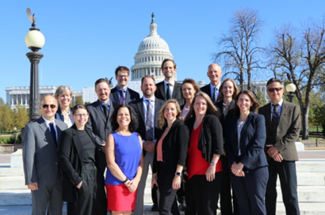NETL’s commitment to driving innovation and delivering solutions for an environmentally sustainable and prosperous energy future requires more than state-of-the-art research facilities and a talented roster of talented researchers. It also requires the kind of departmental leadership that can empower innovative thinking through keen project management skills.
Mary Sullivan is a supervisory engineer at NETL. As a result of her participation in an exclusive U.S. Department of Energy (DOE) leadership training program, she is well equipped to help deliver major high-risk energy research project results as part of a growing culture of project management excellence that spans all of DOE.
Sullivan recently completed a year-long course of study through DOE’s Project Leadership Institute (PLI), a program designed to cultivate a diverse network of successful DOE project delivery practitioners.
DOE has a long history of executing highly technical one-of-a-kind projects to accomplish its mission. Continuous improvement of project management practices and the cultivation of the next generation of project leaders is critical to the department’s future success. PLI was created in 2014 to help improve the department’s management of projects. PLI was designed and is delivered in collaboration with the Stanford Center for Professional Development.
“I was accepted into DOE’s 2021 PLI Cohort and joined 25 colleagues in a year-long program to grow my skills as a leader and foster a culture of project management excellence across the DOE complex,” Sullivan explained. “The instructors and presentations were phenomenal. I hope to be able to share the insights I gained on topics such as diversity, inclusion and equity, leadership, teamwork, emotional intelligence, front-end planning and many other important leadership issues.”
The PLI curriculum that Sullivan completed focused on six key areas with specific events built around each topic. The focus areas were: Preparing to Lead DOE Projects, Becoming Highly Effective Leaders, Positioning the Project for Success, Leadership for Strategic Execution, Delivering High-Risk Complex Projects and Navigating to the Finish.
“In addition to the content provided over the six events, the cohort was divided into five teams that competed against each other on a capstone project,” Sullivan said. “We were required to create a report and presentation on the project management of the Linac Coherent Light Source (LCLS) at SLAC (Stanford Linear Accelerator Center) National Laboratory.”
LCLS is the world’s first hard X-ray free electron laser and is one of the most complex light sources ever developed. Its ultrashort pulses of X-ray laser light are a billion times brighter than any light source and can probe the detailed structure and dynamics of atoms, molecules and materials. Effective project management was critical to its successful construction and startup at SLAC and presented a unique opportunity for the PLI participants to learn.
Sullivan led the cohort that came in first place in the competition. The cohort was made up of colleagues from Lawrence Livermore National Laboratory, SLAC, Fermi National Accelerator Laboratory, and Argonne National Laboratory. The cohort met weekly virtually and interviewed experts including a former director of SLAC to help in the development of project content.
“One of the main benefits of the PLI program is being able to work with an impressive network of program alumni,” Sullivan added. “Previous alumni served as mentors to the current cohort, participated in alumni events, served as evaluators and provided lessons learned. Now, I will be called upon to serve in the same capacity.”
As a conclusion to her participation in the 2021 program, and because that year’s program was affected by COVID restrictions, Sullivan attended the 2022 cohort’s final event in Washington, D.C. last month where she participated in a final round of sessions and capstone project presentations. Nationally recognized experts presented on topics including DOE project leadership, DOE projects from the Capitol Hill perspective, managing crises, making sense of Washington: an enterprise risk management perspective, budget formulation, partnering for success in space launch projects, and leadership in a global project environment.




